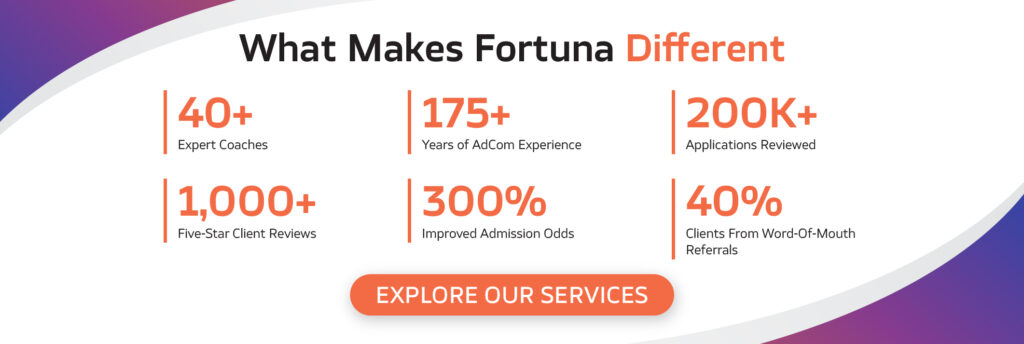The Wharton MBA essay questions include two short‑answer prompts about your career goals, as well as a longer essay focused on how you’ll add value to the community. The short‑form questions ask you to articulate, first, your immediate post‑MBA goal and then your expected path three to five years out – and how those steps connect to your longer‑term aspirations. Looking more deeply, the longer essay invites you to reflect on your personal, professional, and academic background to show how you’ll enrich Wharton’s team‑based, community‑driven environment both during your MBA and as an alum.
Successful essays reflect self-awareness and a profound understanding of the community you’re hoping to join. The strongest responses are clear and specific, backed by evidence from your past and energized by authentic motivation. Show Wharton that you have a thoughtful career trajectory, a genuine sense of purpose, and a proven track record of contributing in ways that will resonate with classmates, faculty, and the broader alumni network.
How to Answer Wharton’s Career Goals Questions?
Prompt: What is your immediate post-MBA professional goal? (50 words)
This is a very short, high‑stakes question. You need to convey focus and clarity in just one or two sentences. Be very concrete – Wharton wants to see a specific role and industry that logically builds on your experience and points toward your longer‑term vision.
Our advice:
- Be direct and concrete. Name the function and industry (e.g., “product manager in a global tech firm” rather than “a leadership role in innovation”).
- Show progression with a logical thread. Even if you’re making a career pivot, your goal should connect to some element of the skills, experiences, or interests you’ve already developed – it shouldn’t feel completely unrelated to your past.
- Keep it crisp. You have only 50 words, so every word counts – strip out qualifiers and extra context.
- Signal ambition with realism. Aim for a role that’s both achievable post‑MBA and clearly tied to a bigger picture you’ll expand on in the next question.
Prompt: What are your career goals for the first three to five years after completing your MBA, and how will those build towards your long-term professional goals? (150 words)
Wharton wants to understand not only the milestones you hope to reach a few years after graduation, but also the bigger vision and personal drive behind them. This is your opportunity to show how you see your career unfolding and why that path matters to you.
Our advice:
- Articulate a clear trajectory. Describe the type of role, responsibilities, and scope you anticipate three to five years out, and how these will stretch you beyond your first post‑MBA position.
- Link to long‑term impact. Show how those experiences will prepare you for the larger professional ambitions you ultimately hope to achieve.
- Bring your motivations to life. Go beyond a linear plan to share what excites you about this path – the problems you want to solve, the industries or communities you want to shape, or the values that guide you.
- Show intention and purpose. The admissions committee is looking for candidates with vision and clarity – people who see their career as more than a sequence of jobs, but as a way to make a lasting contribution.
A compelling response will blend a thoughtful plan with a sense of personal meaning, allowing Wharton to glimpse both where you’re headed and why.

Tackle Wharton’s essays with confidence. In this video with Poets&Quants, Judith shares insider tips on crafting clear career goals and showing how you’ll enrich Wharton’s collaborative community.
How to Answer Wharton’s ‘Value You’ll Add’ Essay?
Prompt: Taking into consideration your background – personal, professional, and/or academic – how do you plan to add meaningful value to the Wharton community? (350 words)
First, a bit of context. As Wharton’s former head of admissions, I can attest that Wharton is, without a doubt, team-based, but it’s also community-based. With around 900 students in any incoming class, the Wharton MBA experience is about being part of a much larger organism than your learning team or your cohort. The admissions committee is interested in discerning how your unique experiences will shape the experiences of your fellow students, the program, and the institution writ large. A thoughtful response to this essay blends introspection, evidence, and passion, allowing the admissions committee to picture the unique energy and perspective you’ll bring to Wharton.
Show the Human Behind the Resume
This essay is your chance to go beyond the facts and figures of your background, and introduce the human behind the application. Think of it as an opportunity to bring your application to life – to reveal values, passions, and experiences that don’t surface elsewhere in your file.
Draw on Your Origin Story
Reflect on formative elements of your personal, academic, or professional journey. What cultural influences, life experiences, or pivotal moments shaped what you do and how you do it? Be specific – instead of simply saying you’re collaborative, share a specific moment that taught you the value of collaboration or ignited your passion for mentoring others.
Connect Past Contributions to Future Impact
Admissions committees operate on the belief that past performance is the best predictor of future impact. Don’t just state what you plan to do while you’re a student in Philadelphia – show credibility by sharing how you’ve already contributed in meaningful ways in previous communities, whether by launching initiatives, mentoring peers, or organizing events. Then connect those experiences to concrete plans for Wharton, such as leading a club, shaping a conference, or bringing in speakers from your industry. And remember, Wharton is also looking for alumni who remain engaged long after graduation, so consider how you’ll continue to contribute as part of the global Wharton network – through recruiting, mentoring, or supporting initiatives that matter to you.
Explain Why It Matters
Go beyond describing what you’ll do and articulate why it’s important to you. What motivates you to contribute in these ways? Perhaps you were inspired by a mentor, saw firsthand the impact of knowledge-sharing, or value creating spaces where others can thrive. Sharing your “why” makes your intentions authentic and memorable.
Key Takeaways
- Reveal the human behind your resume. Share elements of your personal, academic, or professional backstory that shaped who you are today.
- Prove your track record. Highlight past examples of contribution to give credibility to what you say you’ll do at Wharton.
- Map out your involvement. Be specific about how you’ll engage with Wharton’s clubs, learning teams, and initiatives, and how you’ll engage as an alum.
- Explain what drives you. Share the deeper motivations behind your desire to get involved and make an impact.

How to Answer Wharton’s Optional Essay?
Prompt: Please use this space to share any additional information about yourself that cannot be found elsewhere in your application and that you would like to share with the Admissions Committee. This space can also be used to address any extenuating circumstances (e.g., unexplained gaps in work experience, choice of recommenders, inconsistent or questionable academic performance, areas of weakness, etc.) that you would like the Admissions Committee to consider. (500 words)
Wharton’s optional essay is exactly that – optional – so use it strategically. It is not the place to repeat themes from your required essays or restate achievements that are already covered elsewhere in your application. Instead, think of this as an opportunity to complete your story or provide vital context that helps the Admissions Committee evaluate your candidacy more fairly.
- Clarify, don’t clutter. Only use this space if you have meaningful information that addresses a potential concern or adds a valuable new dimension to your application.
- Address red flags head‑on. If you have a gap in employment, a semester of low grades, or a recommender who isn’t your direct manager, explain the situation succinctly and factually – without making excuses.
- Add dimension where relevant. If there’s something crucial about your background, identity, or experiences that doesn’t fit naturally elsewhere in the application, this is your chance to highlight it.
- Be professional and concise. Keep your tone factual and solution‑oriented. If you’re explaining an academic dip, for example, briefly share what happened and – most importantly – how you’ve grown from it.
- Don’t force it. If you don’t have anything truly additive or clarifying to say, leave this space blank. A clean application is much better than one padded with unnecessary information.

Let’s Get You Into Wharton
Fortuna Admissions is a dream team of former MBA admissions decision-makers from top schools. We know what it takes to stand out because we’ve made the admit decisions ourselves. Whether you need help refining your story, strengthening your essays, or navigating interviews, we’ve got you covered.
Our free consultations are consistently rated the best in the industry – and they’re a great way to get personalized advice and honest feedback on your profile. Book your free session with us today.
More Wharton Advice
Discover 3 key things you need to know about getting into Wharton. This video dives into three crucial insights that can make or break your Wharton application.
Want a bigger picture of the Wharton admissions process? Explore our in‑depth guide on how to get into Wharton – from program basics and admissions requirements to insider tips on what the school is really looking for.
How to Get Into Wharton Masterclass. In this webinar, Fortuna’s Wharton insiders share what Wharton really looks for. From essays and recommendations to the Team‑Based Discussion and standing out in a hyper‑competitive pool, this session is packed with guidance you can act on.
Prepare for the group interview. After you’ve nailed your Wharton essays, make sure you’re ready for the school’s distinctive Team‑Based Discussion – read our insider tips and strategy guide for the Wharton TBD and check out Judith’s video conversation about the Wharton group interview, covering how to collaborate, contribute, and stay composed under pressure.




